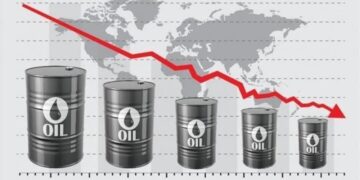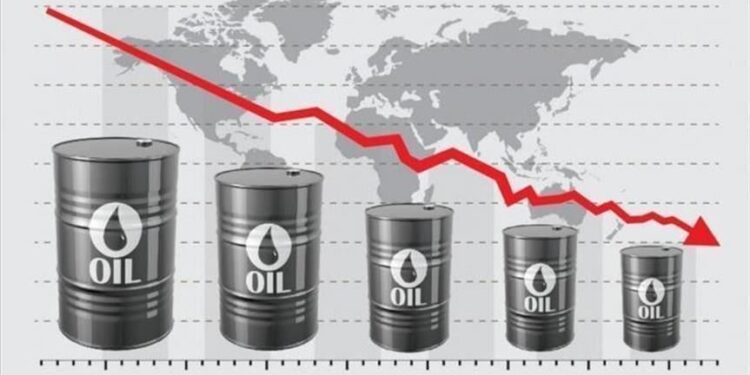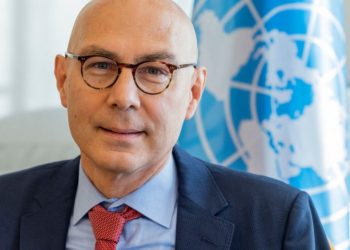Oil prices extended their decline yesterday, with Brent crude sinking to around $68 per barrel, deepening concerns for African economies reliant on petroleum revenues. At the same time, African nations are stepping up diplomatic efforts to attract investment and policy backing from the United States, fearing that global shifts in the energy sector could leave them struggling for resources.
Market turbulence intensified after the U.S. Energy Information Administration reported an unexpected 3.6 million-barrel rise in crude stockpiles, adding to worries about supply outpacing demand. The situation was further compounded by OPEC+’s recent announcement that it would begin easing its production limits in April.
By early trading, Brent crude had slipped 2.13% to $69.53 per barrel, while WTI dropped 2.64% to $66.46, marking its third consecutive day of losses. By the time reports were filed, Brent had dipped further to $68.4 per barrel, reflecting growing uncertainty in global energy markets.
The price slump poses significant financial risks for African oil-producing nations, including Nigeria, Angola, Libya, and Algeria. Lower earnings from crude exports could further strain national budgets and slow economic growth.
Nigeria, which leads Africa in oil production, had structured its 2025 fiscal plan around a projected oil price of $75 per barrel, with an output target of 2.06 million barrels per day (mbpd). However, with actual production closer to 1.8 mbpd and Brent prices now below $70, the country faces mounting budget shortfalls. If prices remain weak, the government may be forced to borrow more, increasing economic instability.
Beyond budgetary concerns, the drop in oil revenue is expected to weaken Nigeria’s Excess Crude Account (ECA) and contribute to fluctuations in the foreign exchange market.
In response to these challenges, the African Energy Chamber (AEC) has partnered with U.S.-based lobbying firm Stryk Global Diplomacy (SGD) to push Africa’s energy interests in Washington, D.C. The initiative seeks to secure financial backing for oil and gas projects, increase Africa’s influence in U.S. policymaking, and challenge Western restrictions on fossil fuel investments.
“Africans need energy to tackle energy poverty and drive economic growth. They should be allowed to make their own choices. Our firm will work to bring Africa’s energy matters to the world’s most important decision-makers,” said Robert Stryk, founder of SGD and a leading U.S. lobbyist.
African energy officials argue that global policies discouraging fossil fuel investments—especially Environmental, Social, and Governance (ESG) regulations—disproportionately impact the continent.
The pressure to transition away from hydrocarbons has led to drastic cuts in financial support from European institutions, with at least 11 major banks withdrawing from fossil fuel lending.
Although Africa proposed a solution in the form of the African Energy Bank (AEB), which was set to launch in January, the institution remains inactive, leaving many energy projects in limbo.
The European Union has been a vocal advocate for ending public financing for fossil fuels, with environmental groups such as Greenpeace amplifying the call for divestment. As a result, African nations have struggled to attract funding to develop new oil fields, maintain current production levels, and expand gas infrastructure.
By engaging with Washington, African leaders hope to unlock new financing opportunities from U.S. investors and energy companies looking to expand beyond traditional regions like the Middle East and Latin America.
Despite its shift towards clean energy at home, the U.S. remains one of the world’s largest oil and gas producers, and its companies are well-positioned to support Africa’s energy ambitions.
Momentum for new investments is already growing. National oil companies, independent firms, and global energy players operating in Africa are preparing for a fresh round of licensing in 2025. Senegal, Namibia, and Côte d’Ivoire have drawn investor attention following major offshore discoveries, while established producers such as Gabon, Equatorial Guinea, and Ghana are working to sustain output despite financing constraints.
“Africa must take control of its own energy future rather than be dictated to by external forces,” said NJ Ayuk, Executive Chairman of the AEC.
The AEC-SGD collaboration aims to ensure that Africa’s position is heard at influential global forums, including the G20 energy dialogues and the African Energy Week (AEW) conference in Cape Town.
A major concern raised by African leaders is that energy poverty presents a far greater crisis than emissions from the continent’s fossil fuel sector.
Across Africa, more than 600 million people lack access to electricity, and nearly 900 million still rely on traditional biomass for cooking, exposing them to severe health and environmental risks. While Africa holds an estimated 620 trillion cubic feet of proven natural gas reserves that could drive industrialization and economic expansion, financing challenges have stalled major projects such as Mozambique’s Rovuma Basin, Senegal and Mauritania’s Greater Tortue Ahmeyim LNG, and Tanzania LNG.
“The notion that producing energy in Africa will lead to a ‘carbon bomb’ is misleading and ignores the critical need for energy access across the continent,” Ayuk added.
With investment hurdles growing, Africa is intensifying its push for support from global partners who recognize natural gas as a bridge to a more sustainable future. Whether diplomatic efforts in Washington will translate into tangible financing remains to be seen.



































